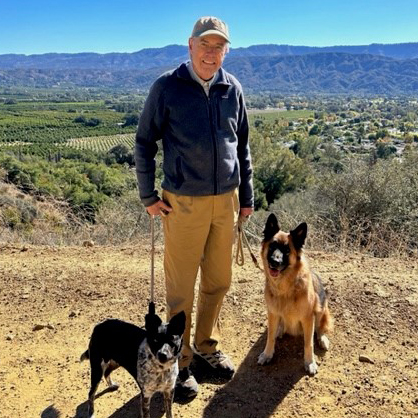Giving the Gift of Research

In August 2013, Donald “Chip” Lesch started experiencing symptoms including back pain and loss of appetite, which he attributed to the strict workout regimen he was following to train for a marathon. But it was the uncontrollable, debilitating chills that convinced him to see his doctor, which led to the biopsy that helped save his life.
Chip and his wife Sheryl were completely shocked when he was diagnosed with Stage 2 ampullary cancer that started in the ampulla of Vater—located where the bile duct and the pancreatic duct join and empty into the small intestine—and spread to the pancreas. Ampullary cancer, which is rare, develops near other digestive system organs (such as the pancreas), and when it gets larger it may impact these other organs. In Chip’s case, the ampullary system containing the ducts had been blocked by his tumor, poisoning his liver, and leading to his incessant chills.
“We’ve been married for 25 years, and Chip is my whole life. There’s no way I’d let something happen to him,” Sheryl said. “That’s why, within a week of his diagnosis, I either met with or spoke to five of the best pancreatic cancer doctors in the country and one in Italy who was an expert in ampullary cancer.”
The experts agreed the best course of action was for Chip’s disease to be treated like pancreatic cancer and for him to undergo a Whipple surgery. If performed correctly, the surgery was considered curative for this rare type of cancer. They selected a surgeon who had completed more than 100 successful Whipple procedures and who was the first surgeon to ever perform this procedure laparoscopically. During the surgery, Chip’s entire ampullary system was removed, as well as the duodenum (the beginning of the small intestine), gallbladder, spleen, and 40% of the head of the pancreas. Sheryl stayed with Chip throughout his time recovering in the hospital, giving each other the strength they needed to overcome this incredibly difficult surgery.
“I’m incredibly blessed to have a phenomenal surgeon and medical team and a wife who advocated so fiercely for me,” Chip remarked. Chip coped by meditating daily and focusing on his spirituality. He and Sheryl are firm believers in the motto that “attitude determines altitude” and they refused to pay attention to survival statistics. “Sheryl picked me up on tough days, and we never looked back.”
Following Chip’s recuperation from the surgery, he had his entire genome mapped, providing a vast amount of data to assist doctors in selecting the best course of treatment if the disease ever returned.
He was advised not to have adjuvant therapy following the Whipple for his rare ampullary cancer case.
For the first four years post-surgery, Chip received scans every three months; now, he has scans every six months. He doesn’t let fear about the disease recurring hold him back. “I’m living at a level I did before my diagnosis, and I’m so fortunate and thankful I can still do everything I love,” Chip noted.
Chip found that his darkest moments—including when he was diagnosed and enduring surgery, and when he experienced survivor’s guilt—provided the greatest opportunities for reflection, change, and growth. His diagnosis caused him to reevaluate his life and his priorities and led to his decision to retire from a successful banking career he loved. He and Sheryl fulfilled a lifelong dream of moving from Chicago to California where they care for rescue animals, ride horses on their property, and walk in the mountains, enjoying each moment with a new understanding, gratitude, and perspective on what is truly important in life.
That perspective has influenced their plans for what will eventually happen to their estate when they pass away, and what they hope their legacy will be. They describe their planned giving donations as “little seeds that help nonprofits achieve their goals, make a positive impact, and optimize their ability to do good.”
While reviewing their estate plan, Chip and Sheryl determined they could add one more nonprofit to support. They learned the Dolan family, owners of MSG Sports, where they had recently purchased stock, were also involved in establishing the Lustgarten Foundation in 1998. Coincidentally, Sheryl had participated in the Rolfe Pancreatic Cancer Foundation’s Dash for Detection, an annual 5K walk/run held in Chicago to support pancreatic cancer research undertaken by Rolfe and by the Lustgarten Foundation. After reaching out to MSG Sports, they were connected with the Lustgarten Foundation.
Chip and Sheryl are honored to join the Lustgarten Foundation’s Legacy of Hope Society of donors who are making a lasting impact on the lives of future pancreatic cancer patients by including the Foundation in their will. Gifts given through the Legacy of Hope Society ensure the vital work of the Foundation will endure until a cure for pancreatic cancer can be discovered.
“Our pancreatic cancer journey changed our lives, and we feel strongly we have a responsibility to enhance and impact the future of pancreatic cancer research. It’s simply not acceptable that more than 50,000 people in the United States will pass away from this disease in 2023,” Sheryl said.
“We are excited to help the Lustgarten Foundation advance new therapies and promote early detection when more treatment options are available,” Chip added. “We are confident that promising developments made in treating pancreatic cancer may also benefit other cancers in the future, and we feel so gratified knowing our gift has the power to change, and may even help save, the lives of patients and allow them to create more memories with their families.”


